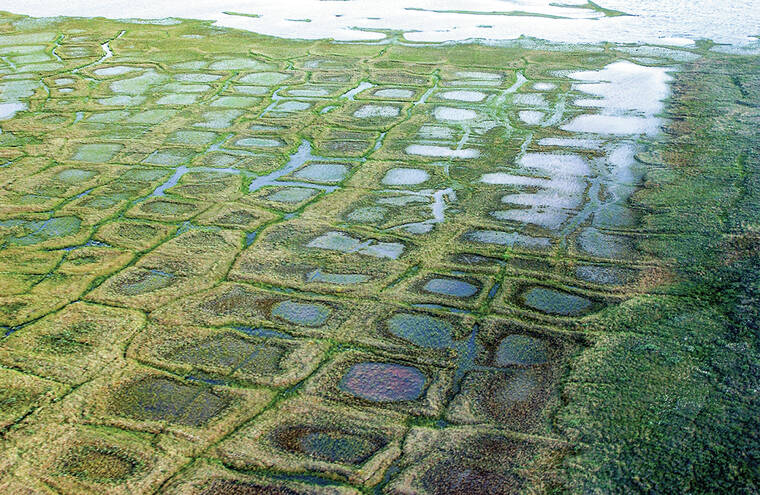Biden administration restricts oil and gas leasing in 13 million acres of Alaska’s petroleum reserve
JUNEAU, Alaska — The Biden administration said Friday it will restrict new oil and gas leasing on 13 million acres (5.3 million hectares) of a federal petroleum reserve in Alaska to help protect wildlife such as caribou and polar bears as the Arctic continues to warm.
The decision — part of a yearslong fight over whether and how to develop the vast oil resources in the state — finalizes protections first proposed last year as the Democratic administration prepared to approve the contentious Willow oil project.
The approval of Willow drew fury from environmentalists, who said the large oil project violated President Joe Biden’s pledge to combat climate change. Friday’s decision also completes an earlier plan that called for closing nearly half the reserve to oil and gas leasing.
A group of Republican lawmakers, led by Alaska U.S. Sen. Dan Sullivan, jumped out ahead of Friday’s announcement about the new limitations in the National Petroleum-Reserve Alaska before it was publicly announced. Sullivan called it an “illegal” attack on the state’s economic lifeblood, and he predicted lawsuits.
“It’s more than a one-two punch to Alaska,” Alaska Sen. Lisa Murkowski said, “because when you take off access to our resources, when you say you cannot drill, you cannot produce, you cannot explore, you cannot move it — this is the energy insecurity that we’re talking about.”
The decision by the Interior Department doesn’t change the terms of existing leases in the reserve or affect currently authorized operations, including Willow.
The Biden administration also Friday recommended the rejection of a state corporation’s application related to a proposed 210-mile (338-kilometer) road in the northwest part of the state to allow mining of critical mineral deposits, including copper, cobalt, zinc, silver and gold. There are no mining proposals or current mines in the area, and the U.S. Bureau of Land Management determined the road-building alternatives analyzed “would significantly and irrevocably impact resources,” the agency said in a statement. A final decision on the recommendation is pending. Brian Ridley, chief of Tanana Chiefs Conference, an Alaska Native nonprofit corporation, said the administration’s “choice to reject the Ambler Road Project is a monumental step forward in the fight for Indigenous rights and environmental justice.” The tribes of the Tanana Chiefs Conference had expressed concerns a road would harm their communities, land and wildlife.
Sullivan accused the administration of undermining U.S. national security interests with both decisions. Alaska political leaders have long accused the administration of harming the state with decisions limiting the development of oil and gas, minerals and timber.
“Joe Biden is fine with our adversaries producing energy and dominating the world’s critical minerals while shutting down our own in America, as long as the far-left radicals he feels are key to his reelection are satisfied,” Sullivan said Thursday at a Capitol news conference with 10 other GOP senators. “What a dangerous world this president has created.”
Biden defended his decision regarding the petroleum reserve.
Alaska’s “majestic and rugged lands and waters are among the most remarkable and healthy landscapes in the world,” are critical to Alaska Native communities and “demand our protection,” he said in a statement.
Nagruk Harcharek, president of Voice of the Arctic Iñupiat, a group whose members include leaders from across much of Alaska’s North Slope region, in a statement said the decision “does not reflect our communities’ wishes.”
The group’s board of directors previously passed a resolution opposing the administration’s plans for the reserve, and Harcharek expressed frustrations that local leaders were not consulted before details of the administration’s proposal were released last September.
“From our perspective, essentially what you’re doing is you’re taking the economic potential and shrinking it to a point where, we don’t know,” he said in an interview regarding Friday’s announcement. “There’s a lot of unknowns associated with that.”
The American Petroleum Institute, the oil industry’s top lobbying group, called the rule “misguided” and said it sharply limits future oil and natural gas development in the petroleum reserve, “a region explicitly intended by Congress to bolster America’s energy security” and generate revenue for Alaskan communities.
“At a time when the world is looking for American energy leadership, this is yet another step in the wrong direction,” said Dustin Meyer, an API senior vice president.
The petroleum reserve, about 100 miles (161 kilometers) west of the Arctic National Wildlife Refuge, is home to caribou and polar bears and provides habitat for millions of migrating birds. It was set aside around a century ago as an emergency oil source for the U.S. Navy, but since the 1970s it has been overseen by the Interior Department. There has been ongoing, longstanding debate over where oil and gas development should occur.
Most existing leases in the petroleum reserve are clustered in an area that’s considered to have high development potential, according to the Bureau of Land Management, which falls under the Interior Department. The development potential in other parts of the reserve is lower, the agency said.


